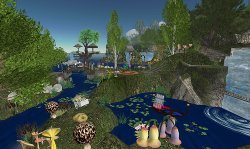Individuals have come up with innovative ways to generate income from the internet. An example would be individuals who played online games for hours everyday and then, these individuals would sell items obtained or characters developed to other users (Jordan, 2003: 44). In exchange for the hours of labours that they would not perform themselves, the buyers paid the players with real currencies. These types of trades are commonly performed these days and they caused controversies as most MMOG producers claimed that they possess ownership of all aspects of the game and these trades performed are considered illegal. Linden Lab is presumably the first MMOG producer who clearly stated that users of their software, Second Life, would retain full ownership of any content that the users have created within the game (Linden Lab, 2003). In other words, users could generate income from trading the content that they have created within the game. This particular feature of Second Life is proven to be attractive with an increasing number of individuals and real world businesses joining Second Life. This essay will discuss the enforcement of intellectual property rights in MMOGs by focusing on Second Life as an example. First, this essay will analyse labour trends in the gaming industry as intellectual property rights are enforced in the first place to reward these labours. The discussion will then be continued by analysing the virtual economy system in Second Life and a comparing it briefly to another MMOG, Everquest. The essay will conclude with attempting to answer the question on whether it is possible to enforce intellectual property rights in the virtual world as in the non-virtual world.
skip to main |
skip to sidebar

Image by Tamique on Flickr

This work is licensed under a Creative Commons Attribution-Noncommercial-No Derivative Works 2.5 Australia License
A discussion on intellectual property rights in the digital information age through an analysis of the virtual economy system in Second Life
Second Life

Image by Tamique on Flickr
About Me
- Stephanie Oentaryo
- Media and Communication student at The University of Melbourne
Blog Archive
-
▼
2007
(9)
-
▼
May
(9)
- Sal Humphreys argues that, “the dynamic, mutable a...
- Introduction
- Labour in the Gaming Industry
- Voluntary Labour in the Digital Information Age
- Second Life’s Sophisticated Virtual Economy
- Enforcement of Intellectual Property Rights
- Distribution: Controlling Time and Space
- Conclusion
- References List
-
▼
May
(9)

This work is licensed under a Creative Commons Attribution-Noncommercial-No Derivative Works 2.5 Australia License
